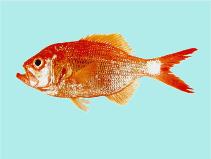| Family: |
Berycidae (Alfonsinos) |
| Max. size: |
51 cm SL (male/unsexed); max.weight: 2,000.0 g |
| Environment: |
benthopelagic; marine; depth range 10 - 450 m |
| Distribution: |
Western Pacific: eastern Australia from western Bass Strait and northeastern Tasmania to Moreton Bay, Queensland. Also found in New Zealand; recently recorded from the Chesterfield Islands and New Caledonia (Ref. 9833). |
| Diagnosis: |
Dorsal spines (total): 6-7; Dorsal soft rays (total): 11-13; Anal spines: 4-4; Anal soft rays: 12-12; Vertebrae: 24-24 |
| Biology: |
Occur on rocky reefs and muddy substrates of the continental shelf and upper slope, forming dense schools close to the bottom at dawn and dusk and dispersing throughout the water column at night to feed (Ref. 9563). Juveniles also aggregate in schools (Ref. 33987) and are found in estuaries and shallow costal waters (Ref. 9833). Feed on small fish, crustaceans and mollusks (Ref. 27111). |
| IUCN Red List Status: |
Not Evaluated (N.E.) Ref. (130435)
|
| Threat to humans: |
harmless |
Source and more info: www.fishbase.org. For personal, classroom, and other internal use only. Not for publication.

